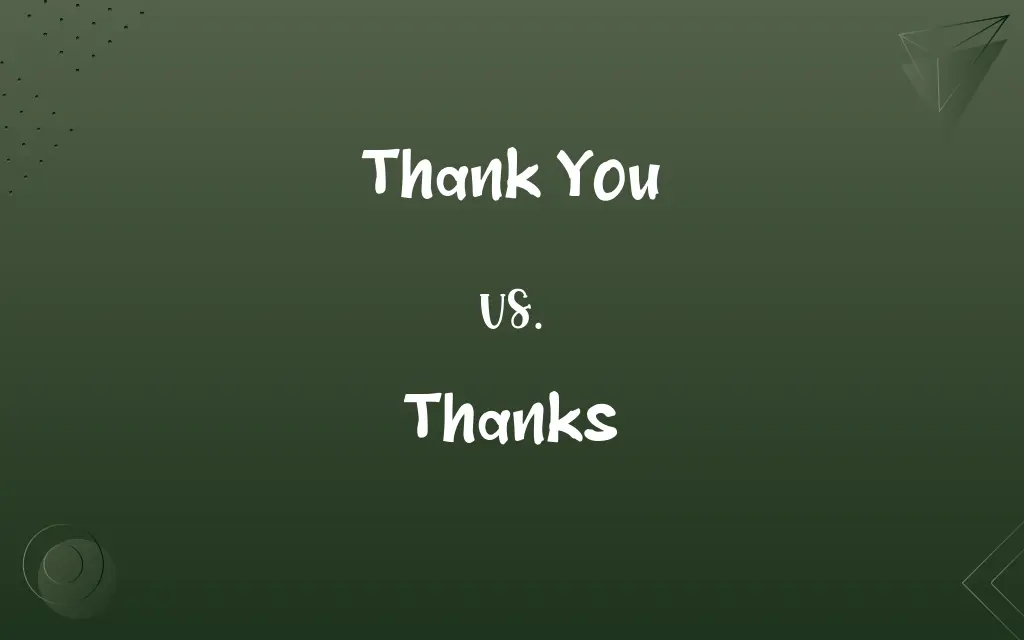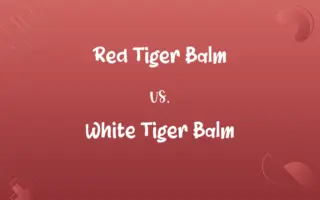Thank You vs. Thanks: Know the Difference

By Shumaila Saeed || Published on January 26, 2024
"Thank You" is a formal expression of gratitude, while "Thanks" is a more casual, brief version.

Key Differences
"Thank You" is often used in formal or professional contexts, reflecting a higher degree of gratitude. On the other hand, "Thanks" is more colloquial and used in informal settings. Despite their difference in formality, both phrases express gratitude.
Shumaila Saeed
Jan 26, 2024
In situations requiring a display of sincere appreciation or in written communication, such as emails or letters, "Thank You" is preferred. Conversely, "Thanks" suits casual conversations and quick notes. Both phrases, however, serve the purpose of acknowledging someone's help or kindness.
Shumaila Saeed
Jan 26, 2024
"Thank You" is a two-word phrase, giving it slightly more emphasis and weight. "Thanks" is shorter and can be perceived as more offhand or less emphatic. Regardless, both are used to express gratitude, with the difference lying in the level of emphasis.
Shumaila Saeed
Jan 26, 2024
"Thank You" is often extended with additional details, like "Thank You for your help" or "Thank You very much." "Thanks" is typically used alone or with brief additions, like "Thanks a lot." Both can be modified to convey varying degrees of gratitude.
Shumaila Saeed
Jan 26, 2024
"Thank You" can carry a tone of formality and sincerity. "Thanks," however, might sometimes be perceived as less sincere or too casual in formal situations. Nevertheless, both are universally recognized as expressions of thanks.
Shumaila Saeed
Jan 26, 2024
ADVERTISEMENT
Comparison Chart
Usage Context
Professional, sincere acknowledgments
Casual, everyday gratitude
Shumaila Saeed
Jan 26, 2024
Add-ons
Often extended with more details
Usually brief, sometimes standalone
Shumaila Saeed
Jan 26, 2024
ADVERTISEMENT
Thank You and Thanks Definitions
ADVERTISEMENT
Thank You
An expression of gratitude.
I must offer a big thank-you to my agent for getting me this job.
Shumaila Saeed
Jan 04, 2024
Thanks
Used to express appreciation or gratitude.
Could you give me a hand, please? — Yes, sure. — Thanks.
Your last gift, for which thanks, made my family so happy.
Shumaila Saeed
Jan 04, 2024
Thank You
(as a modifier before a noun) That expresses thanks.
A thank-you letter
Shumaila Saeed
Jan 04, 2024
Thanks
An expression of gratitude.
After all I’ve done, a simple acknowledgment is all the thanks I get?
Shumaila Saeed
Jan 04, 2024
Thanks
With the help of or owing to;
Thanks to hard work it was a great success
Shumaila Saeed
Jan 04, 2024
Repeatedly Asked Queries
Is "Thank You" suitable for all situations?
Generally, yes, but it may sound overly formal in casual settings.
Shumaila Saeed
Jan 26, 2024
Can "Thanks" be rude?
Not inherently, but it can seem less sincere in formal situations.
Shumaila Saeed
Jan 26, 2024
Can I use "Thanks" in professional emails?
It's better to use "Thank You" in professional contexts for a formal tone.
Shumaila Saeed
Jan 26, 2024
Is there a difference in meaning between the two?
No, both express gratitude, but differ in formality and emphasis.
Shumaila Saeed
Jan 26, 2024
Can "Thank You" be shortened in informal texts?
Yes, it's often shortened to "Thanks" or "Thx" in informal texting.
Shumaila Saeed
Jan 26, 2024
Is "Thanks a lot" sarcastic?
It can be, depending on tone and context, but not always.
Shumaila Saeed
Jan 26, 2024
Are there situations where neither phrase is appropriate?
Rarely, as expressions of gratitude are almost always suitable.
Shumaila Saeed
Jan 26, 2024
Is "Thank You" always better than "Thanks"?
No, it depends on the context; "Thank You" is formal, while "Thanks" is informal.
Shumaila Saeed
Jan 26, 2024
Can "Thank You" be perceived as too formal among friends?
Sometimes, as "Thanks" is more commonly used in casual conversations.
Shumaila Saeed
Jan 26, 2024
Can "Thanks" be used in written thank-you notes?
It's better to use "Thank You" in written notes for a more formal tone.
Shumaila Saeed
Jan 26, 2024
Are there variations of "Thanks" that are more formal?
Phrases like "Thanks a lot" or "Many thanks" are slightly more formal.
Shumaila Saeed
Jan 26, 2024
Is it okay to just nod instead of saying "Thank You" or "Thanks"?
In some cultures, a nod can suffice, but verbal thanks are generally preferred.
Shumaila Saeed
Jan 26, 2024
Is "Thanks" suitable for thanking someone who has gone out of their way to help?
In such cases, "Thank You" is more appropriate for its sincerity and emphasis.
Shumaila Saeed
Jan 26, 2024
Does the addition of "very much" change the formality of "Thank You"?
It adds emphasis but maintains the formality.
Shumaila Saeed
Jan 26, 2024
Do "Thank You" and "Thanks" differ in other languages too?
Yes, similar variations exist in other languages regarding formality and usage.
Shumaila Saeed
Jan 26, 2024
Is it impolite to use "Thanks" with elders or superiors?
It might be seen as too casual; "Thank You" is safer in such situations.
Shumaila Saeed
Jan 26, 2024
Can "Thank You" be used sarcastically?
Like "Thanks," it can be, though its formality often makes it less likely.
Shumaila Saeed
Jan 26, 2024
Can body language impact the perception of these phrases?
Yes, body language can reinforce or undermine the sincerity of the message.
Shumaila Saeed
Jan 26, 2024
Is "Thank You" more common in certain cultures?
Yes, some cultures may prefer a more formal expression of gratitude.
Shumaila Saeed
Jan 26, 2024
Share this page
Link for your blog / website
HTML
Link to share via messenger
About Author
Written by
Shumaila SaeedShumaila Saeed, an expert content creator with 6 years of experience, specializes in distilling complex topics into easily digestible comparisons, shining a light on the nuances that both inform and educate readers with clarity and accuracy.









































































